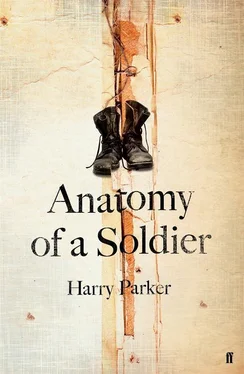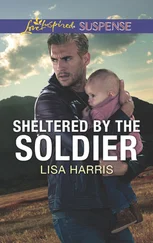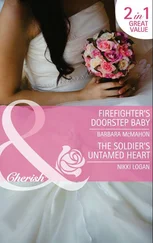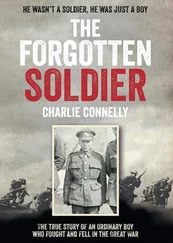The engine sound changed and the thud of passing rotors deepened as the aircraft flared into its final approach. We decelerated over the wall of a camp and its watchtower, where a soldier shielded his eyes against the debris. A green tent was blown free and tumbled away across the courtyard until it caught in a vehicle’s bar armour.
Dust kicked up by the downdraught engulfed the helicopter as it lurched in the blindness. Feeling suddenly weightless, the men tensed. The aircraft bounced on its suspension, skidded sideways and then the engines howled and we were airborne again, lifting away through the churning cloud. I pressed into the floor and BA5799 braced his legs against me and closed his eyes in helplessness, his stomach lurching.
The crewman spoke urgently into his microphone and scanned the tree lines around the patrol base, his thumbs ready to depress the triggers as we banked out of the pyre of dust.
We were over the desert again, pitching from side to side, and then we slowed and passed over the same perimeter wall and watchtower. We bounced once and stopped, rocking on the suspension.
The crewman stood up from his gun, lowered the rear door and released the strap holding the Bergens. BA5799 pushed the cylinder to release the belt and slid me up onto his back. He dragged his Bergen free and pulled it down the ramp onto the HLS, out from under the rotors.
The four men crouched together as the helicopter lifted away. Wind stripped dirt and sand from the ground and blasted it against me. The aircraft disappeared over a wall and soon after the attack helicopter high in overwatch drifted away in pursuit and it was quiet.
A man in a T-shirt and flip-flops came out from behind a wall.
‘Welcome to Patrol Base 43,’ he said. ‘I’m the second in command. That looked like a bit of a roller coaster. Maybe the pilot couldn’t handle the brownout; can’t be easy though. We once had three attempts.’ He grinned. ‘We weren’t expecting you until tomorrow. Not that we ever get much warning anyway.’ He looked down at me and the other bags. ‘Any post with you? No? Bugger. Post’s about the only thing that makes up for having the camp destroyed every time they come in. Here, let me take that, I’ll show you where you’ll be based and we’ll need to sign you in at the ops room.’
BA5799 picked me up and adjusted my shoulder straps and we followed the man across the HLS into a courtyard of thick mud walls rounded by weather. A few men hammered tent pegs back in, another collected strewn washing.
The man pointed BA5799 to a narrow opening in a wall that led into a dark room with two Z-beds. ‘That’s where officers stay, and I’ll just show the others to the NCOs’ lines. I’ll come back and give you a tour of the camp in a bit.’
BA5799 ducked through the doorway, sat on a camp bed and leant his rifle against me. He unclipped his helmet and ruffled his flattened hair, then he stretched, opened my top pocket and put his goggles away.
The man came back and stood silhouetted in the doorway.
‘You okay? I’m Dave,’ he said and held out a hand.
‘Tom. Yes, fine, thanks — good to be here.’ They shook hands.
There was a sharp clap outside and then another. They both flinched. And then two distant thumps.
‘Ah, the teatime contact,’ the man said and looked out of the doorway. ‘The heli must’ve got them all excited. Grab your helmet and rifle, Tom. No better way to show you the camp.’
BA5799 zipped my pocket back up, fastened his helmet strap, clipped a magazine onto his weapon and followed the man out into the light as the air started to clap an uneven rhythm.
I was covered in foreign dust and he left me beside a camp bed in the small room dug into a compound wall. A camel spider crawled across the ground and felt with its hairy legs up and over me.
I was normally placed on the lime-green tablecloth in the kitchen. That day I was next to the dog lead on the coffee-stained newspaper. The doorbell rang. The dog barked. The dark outline of two figures showed through the glass panels. She came in from the sitting room and shut the dog out behind her. She craned her neck to see. She wasn’t expecting anyone.
It was a man and a woman. He was wearing a regimental tie. They said her name. She nodded. They asked if they could come in. She gripped the door and didn’t open it any wider and asked what had happened. She didn’t want them to come in. She had imagined the horror of this moment, but she was numb. She was aware of the potential for grief. It curled around her throat and fluttered in her stomach.
She remembered her son’s smile and the last time he’d walked out of the gate and said that he would be fine and she remembered wishing he wouldn’t tempt fate like that. She remembered when he was eight and had cried on the way to school. She remembered when he finished training and how proud she had been.
She remembered she’d felt the same dread every time the doorbell had rung since he had been away. She remembered not wanting to go downstairs and the relief when it had been door-to-door salesmen, and how much nicer she had been to them. And now she wished she hadn’t come downstairs.
Maybe she could just take the dog for a walk and they wouldn’t be here when she came back. She didn’t want to face this on her own.
They asked again if they could come in. She let them in but wanted them to go away and never return — to have never existed. She put the kettle on and told them they would want a cup of tea. It wasn’t real until they said it.
They told her it was fine and she should really sit down. They sat around the table and the man asked a number of questions confirming who she was. She just wanted to know now, to just be told so the horror could start. She knew she was about to be damaged; it would change everything. He asked if she was his mother — of course she was.
The woman stood up. She looked grave and hadn’t said anything since they had come in — she probably hated doing this. ‘Let me make you a cup,’ she said and went over to the kettle. She took a mug from the cupboard, but when she saw it had Mummy’s Little Soldier written on it she put it back and chose another.
And then the man told her what had happened. Her son had been very seriously injured and was being operated on, it was the best front-line medical facility in the world. He said they didn’t know many details yet but he was very seriously hurt, had lost a lot of blood and his left leg — that was all they knew at the moment.
She was relieved — he wasn’t dead. Her son was still alive. The man continued to talk and asked where her husband was and if she should call him. She reached over and picked me up, pulled my magnetic clasp apart and took her phone from inside me. Her voice shook as she told her husband, not knowing how to form the words. She gave as many details as she could and then her voice started to break and she handed the phone over to the man. He explained the same things he had to her and then put the phone down and told her he was on his way back.
She remembered him, three years old, running down the beach on holiday giggling. She wanted to cry but couldn’t. Not in front of these people. The woman put a cup of tea in front of her. She looked at it but didn’t see it.
Then she asked what very seriously injured meant and whether he would live. They gave answers she knew they were trained to give and realised that even though she wished they had never come, they hated this too and she felt sorry for them.
Suddenly she knew the relief might be unfounded, that her son might already have died on an operating table. She thought of him dying — perfectly formed — and desperately far away, without her. And then she remembered the man had said he’d lost a leg and she adjusted the image on the operating table, and her imagination went too far and added injury after injury. It deformed him and he wasn’t her son any more, and it was too much and her face began to crumple and she asked them if they would just give her a moment. She grabbed me from across the table and went out of the room and stumbled upstairs, pulling herself forward with the banister.
Читать дальше












